|
|
Post by scubakate on Jul 27, 2018 6:47:39 GMT -8
Hi there! I’m new to the forum. I’m a new diver in my 30s that wanted to learn to dive since I was 10, and was finally certified (OW, AOW, Nitrox) at a couple popular backpacker destinations in my 20s. (More thoughts on education, later if you care)
I’m interested in learning more about true vintage style diving and equipment, but more importantly, what “vintage” values, skills, and educational materials I should seek out that will help me be a better, more knowledgeable diver, even if I ultimately opt to use a computer. In my life and other hobbies, I like to learn the “old” way of doing things so I know why things are now done how they are, and which “innovations” are actually overrated. I appreciate and enjoy using tools (sewing machines, cameras, other things) from my parents’ and grandparents’ generation that are simplified and built to last.
Now, I’m not quite aiming to ditch the BCD just yet (hey, if it’s good enough for the one and only Sylvia Earle, it’s good enough for me), though I’d absolutely love to try it one day. But to start, I ordered a few books I saw mentioned frequently in this thread: some early editions of Basic Scuba, The New Science of Skin and Scuba Diving, The Silent World and some others. I thought that would be a good way to get a primer.
Aside from vintage equipment, what else should I focus on that you think has been lost or diluted? For “vintage” divers and instructors, what do you most want other divers, especially your students, to understand?
I gather it includes something like:
- Knowing the history of scuba
- Valuing simplicity over loading up with gear (appropriate to the environment)
- True mastery of buoyancy, weighting and breathing
- Self sufficiency in safety, navigation, and dive planning, and not relying on the guide
- Realizing that OW and AOW are actually “beginner 1” and “beginner 2” and that certification is nothing if it doesn’t involve real education
- learn to dive locally with experienced divers and not just on vacation
- Know your equipment inside and out
- Old equipment isn’t outdated if it functions
- You shouldn’t NEED a computer
What else should be the main takeaways of vintage style diving? In your opinion, what kind of education should I seek out for myself?
|
|
|
|
Post by cnotthoff on Jul 27, 2018 9:00:16 GMT -8
This old diver in his 60's is impressed that you've pretty much nailed it. The New Science of Skin and Scuba was my Basic Diver text.
Is there a dive club in your area? That can be a great way to meet divers with similar interests. It's little tougher to find divers who focus on vintage gear and techniques, but they're out there.
Welcome and Good Dives,
Charlie
|
|
|
|
Post by herman on Jul 28, 2018 3:30:26 GMT -8
You have a good start. If you can find someone who dives the old equipment close to you that can help you along, that would be a big help....now about that BC.... Might have been good enough for Sylvia but Zale Parry never used one.  Another book to consider is "Regulator Savvy" by Pete Wolfinger. It's a book about how dive regulators work starting at the basic physics level and goes over the internal working of dive regulators. While not about vintage gear, the principals of operation are still the same. If you want to dive vintage gear then you will need to service your own gear since no dive shop will. To do that well, you need to understand how they work. As you first DH regulator, I would suggest you find either a DA Aquamaster (DAAM) or a Royal Aquamaster (RAM). They are very common, reasonably priced and more importantly, all the parts (reproductions) needed to completely restore them to better than new operation are available at reasonable prices. While other regs can be restored, you have to depend on scavenged or hard to find old stock parts, makeshift parts or making your own parts, not the best idea for a novice. In addition, there are modifications available for them to add HP and LP port so you can transition between modern equipment and vintage more easily. I would suggest surfing the internet for information on vintage diving. There has been a lot written over the last few years about it and there are a few good Youtube videos as well......and some pure BS info as well so don't take all you see and read as gospel. By the way, the old Sea Hunt show is fun to watch, esp to see the old gear in action but it's a horrible example of how to dive. |
|
|
|
Post by DavidRitchieWilson on Jul 28, 2018 5:57:25 GMT -8
When I qualified at my university diving club back in the late 1960s, basic swimming, snorkelling and water survival skills were developed and assessed before anybody proceeded to the use of scuba equipment. In the process, all beginners back then developed a respect for basic water skills without breathing apparatus and were able to deploy them in the event of gear failure. This ought to be part of vintage diving training.
As a "vintage snorkeller", never a scuba diver, I'd also like to see vintage dive training give due attention to equipment other than double-hose regulators, such as oval masks, J-shaped snorkels and old-school fins, basic gear made from traditional materials, not "space-age synthetics" or "technopolymers"! Information about domestic and foreign sources of such equipment should be pooled and shared.
As well as the history of diving and diving gear, I'd welcome some geographical input too, fostering appreciation of the historical development of the activity and the equipment within a worldwide context and not just within a single country. We have much to learn from the pioneers of diving within Europe, Russia, Asia and the Antipodes as well as in the Americas.
DRW
|
|
|
|
Post by scubakate on Jul 28, 2018 7:54:35 GMT -8
Thank you for the responses! I’m located in New York City. There is a community of people for everything here, and it seems like as a major coastal city, vintage diving is no exception. I’m looking into getting involved with a local dive club, mostly because I just don’t know other divers here and want to get wet and learn a few things.
I agree regarding water safety and am particularly interested in getting more training about emergencies. I’ve participated in various water sports my whole life (some competitive, some not), grew up around lakes, and worked as a lifeguard and a swim instructor, so it seems that I’m likely more in tune and critical than the average beginner about risks and instruction quality, plus I’m a decently strong swimmer to start with. As a former teacher, I also think a lot about the difference between “knowing” something for a test and fully understanding it to the point of being able to deploy that knowledge in “real life.” It makes me wonder how many divers don’t know what they don’t know or aren’t honest with themselves about their lax preparation. I have definitely experienced a couple moments diving where I noticed myself being overly dependent on a DM and have used that as a teachable moment for myself.
From my perspective, a well taught Rescue Diver course should be highly encouraged and I plan on taking one. I love safety protocol!
I’ve been watching the old Jacques Cousteau programs on YouTube. Right away I noticed that they swim down to depth instead of deflate. I hadn’t thought about that before reading about vintage diving. How exciting that must have been to see that when they premiered! It’s fantastic even now, especially with Rod Serling narrating.
Now we have so much excellent nature programming that it’s easy to take it for granted and not think about the divers behind those cameras.
|
|
|
|
Post by nikeajax on Jul 28, 2018 8:01:37 GMT -8
Ahoy, and welcome to our forum! I too am very anachronistic in just about everything I do: I still use my mother's sewing machine for everything, as it's made better than anything you can find today: 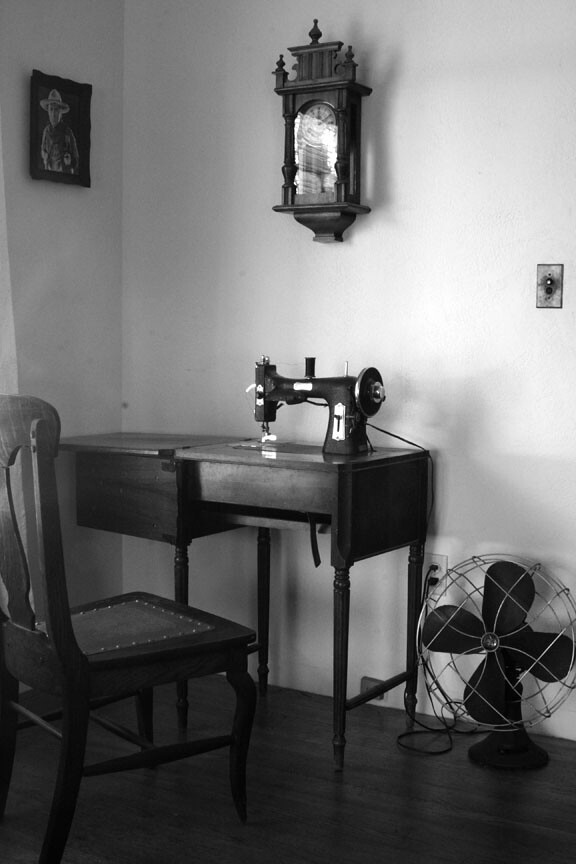 While not absolutely necessary, BC's are excellent to have, think of them like seat belts in your car: you don't often use them for their designed function, but, when you need then they will absolutely save your life: 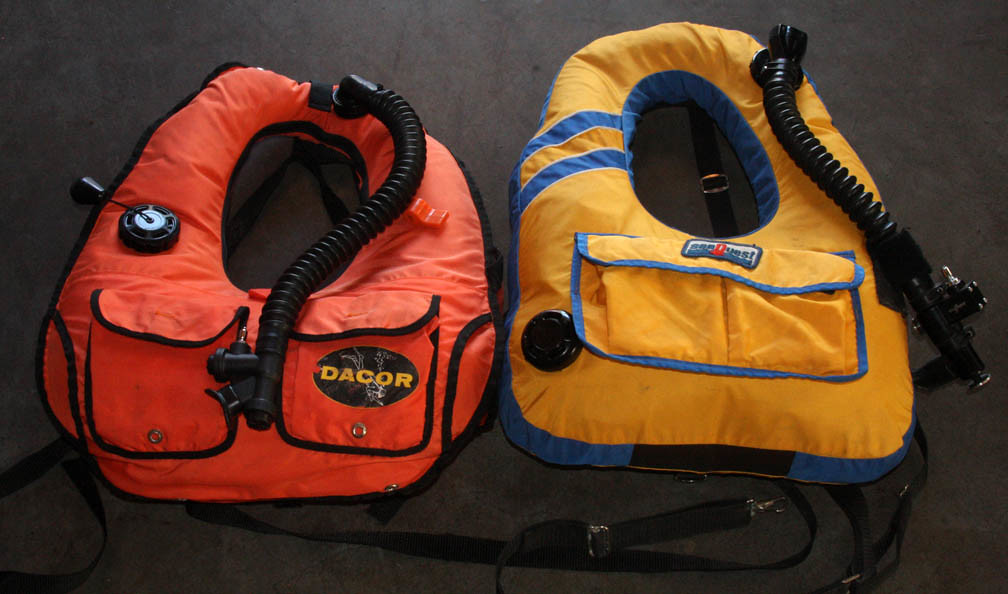 The nice thing about a horse-collar style is that you they don't need to have any air in them until you want them if you can dial-in your buoyancy, also if a diver is unconscious, they are floated on their back, face out of the water! As for regulators, I would suggest a US Divers Conshelf-XIV: 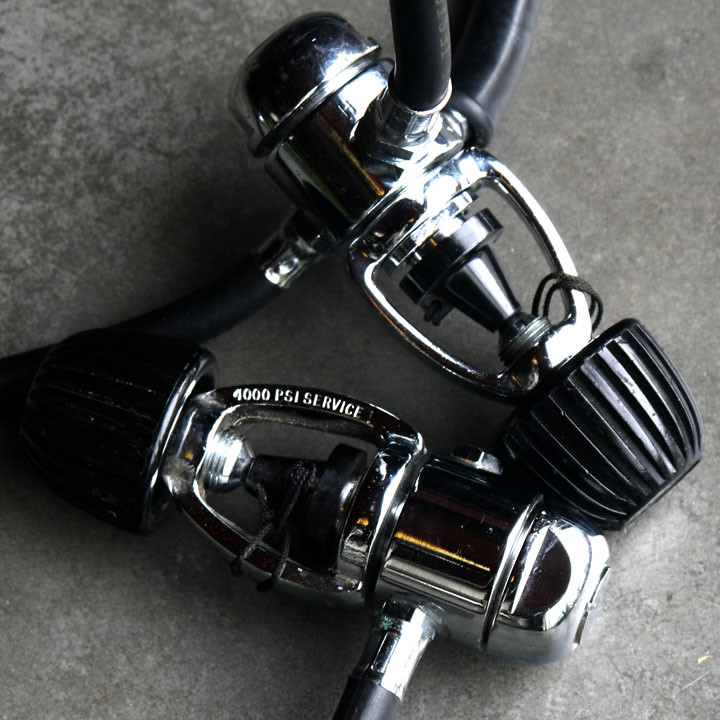 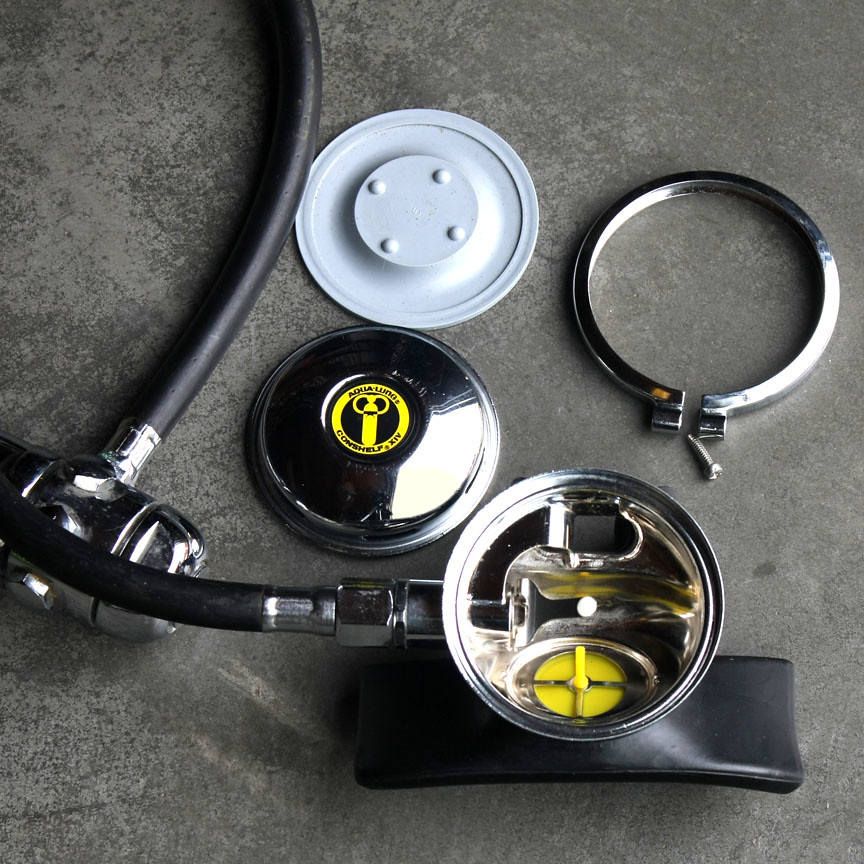 The reason being is it's a workhorse, parts are still available, and the design hasn't changed much since the mid-1960's. While I prefer more esoteric stuff for myself, I demand something bullet proof for my wife's safety, this is hers!!!!!! I won't dive with anything other than a wrap-around type mask: here is a US Diver and Healthways: 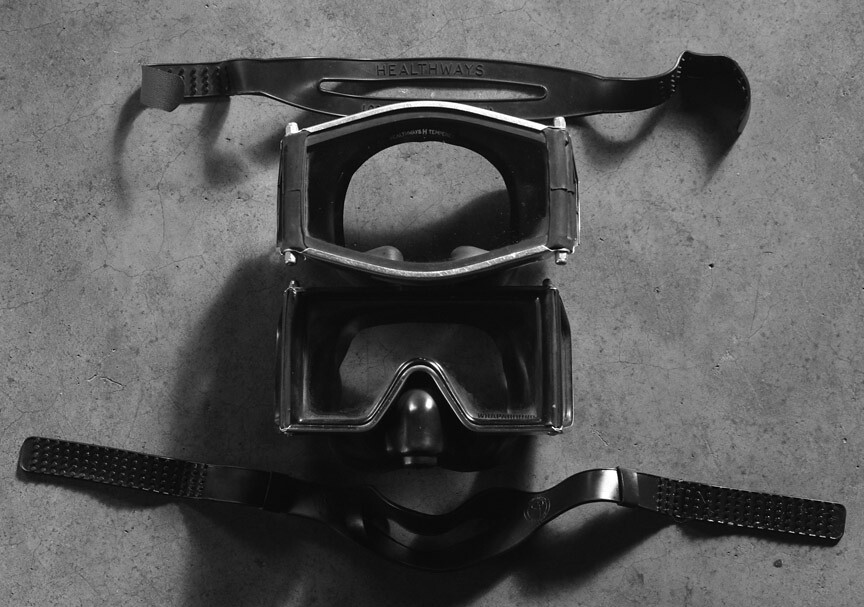 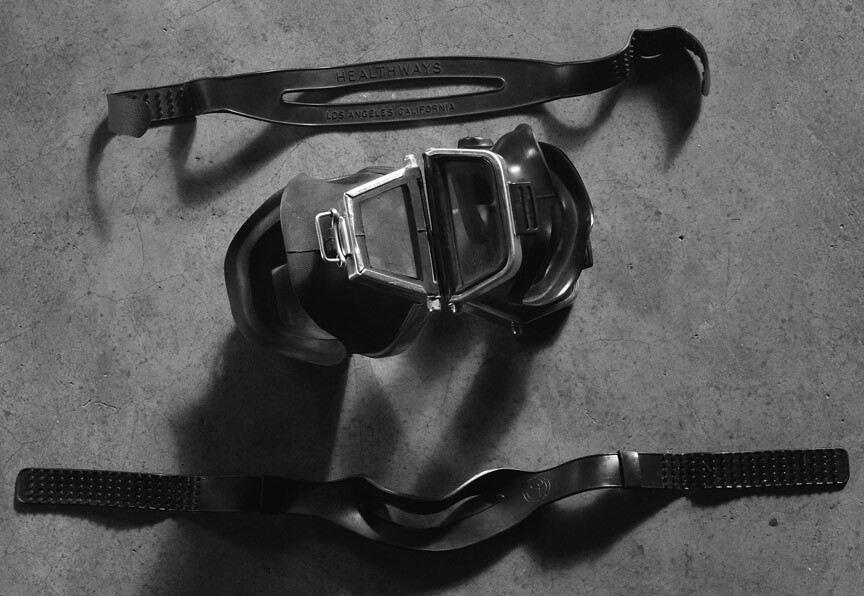 While high-volume, having peripheral-vision is something I won't do without. All of these pieces will help you get an easier understanding of older tech without going back to the double-hose standards: slowly work your way to a DH gradually until you know what you're doing and your confidence in your gear and how it works is second nature. The reason why people think old gear is a health and safety hazard is because they don't know how or why it works. I much prefer quirky stuff to easy-come-by things, I enjoy the hunt of making that weird piece of technology function: the reg in the front is a Healthways Divair: 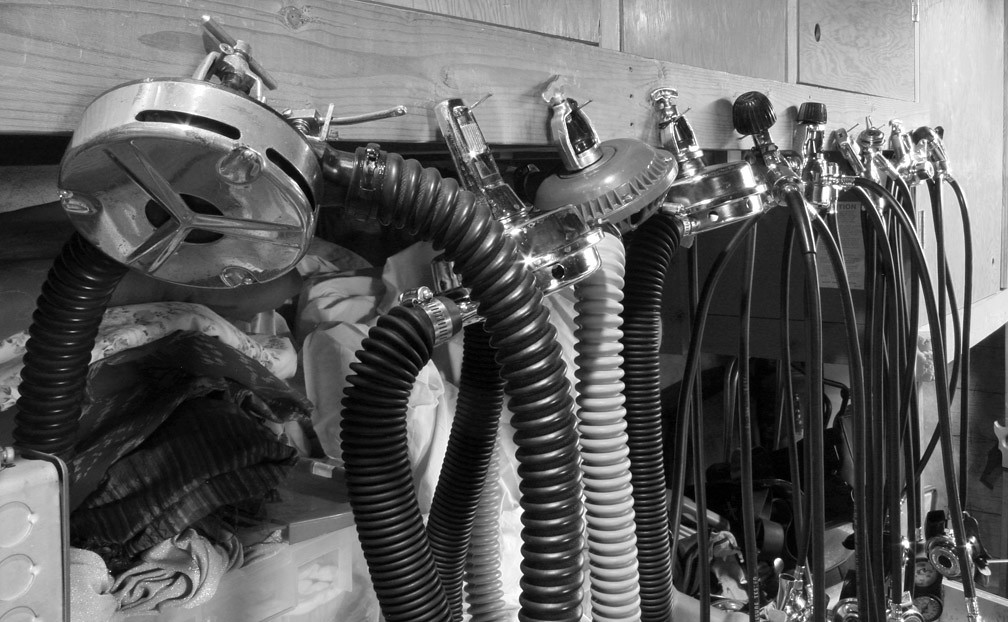 Rare, funky and fun from about 1956-ish! Jaybird |
|
|
|
Post by scubakate on Jul 28, 2018 8:14:31 GMT -8
Yes, I think a horse collar would be interesting. I like the safety belt analogy. I’d also like to try out a backplate and wing (which might be too modern for this board?) if that opportunity presents itself, so I can get out of the jacket but have the option of inflation.
Nice sewing machine! All metal ones are the best. I have a 1970s Pfaff (almost all metal).
I love the look of the old masks. Now that’s something I could get into with a limited learning curve.
|
|
|
|
Post by nikeajax on Jul 28, 2018 8:26:15 GMT -8
While we do have nature shows today, they aren't the same as those created in the 1970's and before: why? Today we get multiple takes and digital tech makes things so much faster, etc. Back then though, there was a certain je ne sais quoi you can only get when you're flying by the seat of your pants. When I was a boy watching the "Undersea World of Jacques Cousteau" TV specials, they weren't always on, they were like a drug that would intoxicate me, to where I where I needed to do that one day: it was a lust for adventure that I could partially quench by living vicariously through the likes of Albert Falco and the rest of the crew of the Calypso, or Jim Fowler on "Mutual of Omaha's Wild Kingdom".
JB
|
|
|
|
Post by nikeajax on Jul 30, 2018 14:20:04 GMT -8
Kate, please check your inbox: PM sent...
JB
|
|
|
|
Post by vance on Aug 2, 2018 7:55:33 GMT -8
Yes, I think a horse collar would be interesting. I like the safety belt analogy. I’d also like to try out a backplate and wing (which might be too modern for this board?)....... I love the look of the old masks. Now that’s something I could get into with a limited learning curve. We're a pretty tolerant bunch. Some are strictly vintage divers (when doing the vintage thing), but many of us mix in whatever equipment we like and don't turn our noses up at who's doing what. We all have different interests, as well. Some of us are mainly divers, some are dedicated collectors, some are inveterate tinkerers, but most are a mix of all of the above. Mainly, a lot of us are vintage ourselves and used this stuff back in the day! BTW, that's how it starts: "I'd love to get a hold of one of them cool old (insert equipment type) and try it out." Next thing you know, you have 6 of them, and you're scouring eBait for more while thinking about vintage regulators, or wetsuits, or cameras, or fins, or horsecollars, or........ |
|
|
|
Post by crabbyjim on Oct 15, 2018 12:48:55 GMT -8
Yes, I think a horse collar would be interesting. I like the safety belt analogy. I’d also like to try out a backplate and wing (which might be too modern for this board?)....... I love the look of the old masks. Now that’s something I could get into with a limited learning curve. We're a pretty tolerant bunch. Some are strictly vintage divers (when doing the vintage thing), but many of us mix in whatever equipment we like and don't turn our noses up at who's doing what. We all have different interests, as well. Some of us are mainly divers, some are dedicated collectors, some are inveterate tinkerers, but most are a mix of all of the above. Mainly, a lot of us are vintage ourselves and used this stuff back in the day! BTW, that's how it starts: "I'd love to get a hold of one of them cool old (insert equipment type) and try it out." Next thing you know, you have 6 of them, and you're scouring eBait for more while thinking about vintage regulators, or wetsuits, or cameras, or fins, or horsecollars, or........ Some additional thoughts on the bc. The Mike Nelson’s rely on being properly weighted and using the lungs for buoyancy adjustment. This requires practice and has limitations based on depth of dive and buoyancy of the wetsuit. Scubalawyer made it look easy at our Monterey meet. When I started diving in 1970, we used a modified “MaeWest” life vest. Inflated orally or with a CO2 detonator, it was a “self rescue” device. Horsecollars with power inflators came next, followed bt jacket bc’s. The weight integrated bc came next and soewhere in that timeline the back mounted bc became popular. Horse collars are great for swimming on the surface on your back but squeeze you between the tank and bc if you are on the surface with an inflated bc and swimming face down. I prefer proper weighting with a backplate with back inflation and a weight belt because it is easier. I think Vance wil agree with that. That said, the contributors to this forum are tolerant and helpful. |
|
|
|
Post by nikeajax on Oct 15, 2018 16:39:15 GMT -8
You said it bruddah!  JB |
|
|
|
Post by scubadiverbob on Oct 18, 2018 9:10:28 GMT -8
Nikejax, nice White sewing machine!
The best thing about most older gear, most wasn't made out of plastic and was designed to last for years! Why most dive stores don't really like them. They want to sale you a new regulator every year! It's like dive classes, when I got AOW, we was taught many things now you got to take many classes and pay lots of money to learn. My deep dive was to 150 ft and was a deco dive. We was taught high altitude diving in AOW. Your right about what's taught now. It's all about money!
If you get into underwater photography, double hose is the way to go! Learn how to clear one is very important. It's in US Navy dive manual. Best to get with another diver who knows the ropes to teach you.
Have fun diving and dive safe!
|
|
|
|
Post by scubadiverbob on Oct 18, 2018 9:19:25 GMT -8
And if you can dive with no air in your bc, you got your weights adjusted right. If you need air in your bc, you might be overweighted. Just a thought. Not to many are taught to adjust their weights properly, it takes time and many instructors just want to make sure the divers will sink; so, they overweight the students. Makes it easy ...
|
|
|
|
Post by cnotthoff on Oct 26, 2018 9:59:00 GMT -8
Thoughts on what we learned and what I'm teaching now.
I've changed 2 major things in my current scuba class.
I can't honestly tell students they need to be able to work dive tables forward and backward to dive safely. I've addressed the dive tables as a means of understanding nitrogen loading and off-gassing. They will have a basic understanding about how to profile their dives. I've spent more time on how to properly use a dive computer.
I teach them that every dive must include an out-of-air plan. Sharing the same regulator (buddy-breathing) is not an option. I spend more time on getting comfortable with sharing air with an octopus or whatever setup they have.
I didn't make these changes lightly. I understand that having the composure underwater to buddy-breath is a good thing for divers. I found that the greater difficulty of buddy-breathing made a greater impression on students causing them to hand off their primary when surprised by a diver in need of air. I don't think I've consulted a dive table during anything but training in 20 years.
I'm interested in thoughts from those of us who learned to dive before computers and octopuses.
Good Dives,
Charlie
|
|














